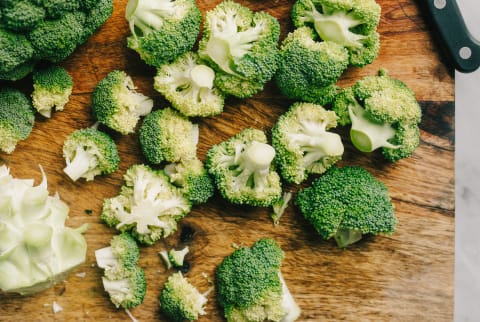Advertisement
Drink Coffee Too Close To Bed? A Sleep Expert's Trick To Digest It Faster


As a three to four cups of coffee a day kind of person, I'll be the first to admit that my caffeine habits can occasionally affect my sleep quality. In general, I don't become highly energetic or jittery, but when my coffee consumption slips well into the evening, tossing and turning can ensue.
I know that a late afternoon pick-me-up or an espresso with dessert will never be totally off the table for me, so I'm always on the lookout for small ways to ways to consume caffeine a little more mindfully and healthily. And I recently learned about one that was way too good not to share.
What broccoli has to do with caffeine
According to clinical psychologist and board-certified sleep specialist Michael J. Breus, Ph.D., aka "the sleep doctor," caffeine has a half-life of six to eight hours.
Meaning if you stop drinking it at 2:00 p.m., only 50% of it is out of your body by 10:00 p.m. This is why Breus recommends cutting off caffeine early in the afternoon if possible.
However, Breus explained during a recent roundtable discussion on the science of sleep, "if you happen to have caffeine late at night, broccoli may help you digest it faster."
It sounds absurd, but stay with me here! According to a 2007 study published in the peer-reviewed journal Current Drug Metabolism, broccoli induced the liver's cytochrome P4501 enzymes, which helped to metabolize caffeine in participants. To put things in context, they ate 500 grams of broccoli (about five and a half cups of chopped broccoli) and 100 milligrams of caffeine in tablet form (i.e., the approximate caffeine content in one cup of coffee).
A more recent meta-analysis of 23 dietary intervention trials shows that cruciferous veggies, including broccoli, as well as Brussels sprouts, cabbage, cauliflower, radish, and watercress also support the metabolism of certain substances2. (Plus, these cruciferous veggies are nutrient-dense and thus, stellar for other reasons, too). Interestingly, the P450 enzyme especially affected by these vegetables was CYP1A2, which also happens to be the primary metabolizing enzyme for caffeine!
"So if you do have a late-night latte, just order some steamed broccoli," Breus suggests. Eating these cruciferous veggies steamed limits the likelihood of bloat—something you certainly also want to be mindful of before bed!
The takeaway
If you happen to drink your coffee too late into the evening, and you're worried it'll disrupt your sleep, try snacking on a bit of broccoli. Studies suggest it may help metabolize some of the caffeine that keeps us up at night. And if you're not convinced broccoli will do the trick, consider following up your brew with a science-backed sleep supplement, like mindbodygreen's sleep support+, which promotes deep and restorative sleep without the melatonin hormone.*
